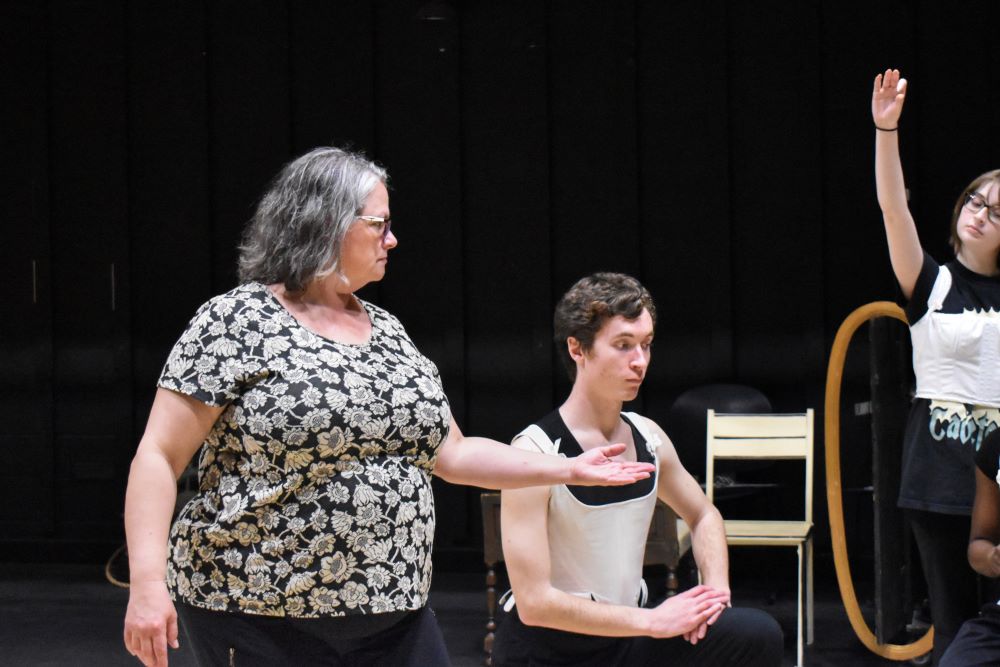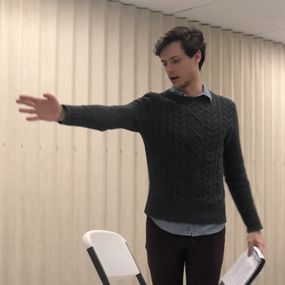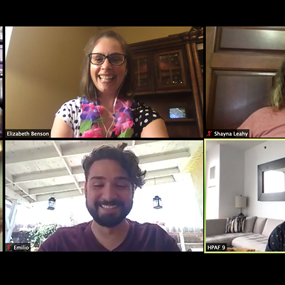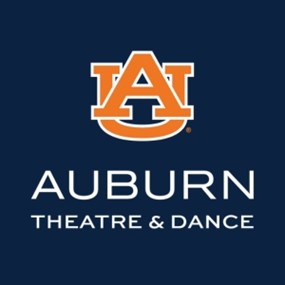Interview with Ashley Butler, director of 'Orlando'

The Auburn University Department of Theatre & Dance will present "Orlando" at the Telfair B. Peet Black Box Theatre from Feb. 20 to March 1. Director Ashley Butler discusses how Auburn's rendition will approach Sarah Ruhl's captivating theatrical adaptation of Virginia Woolf's classic novel.
Q: Sarah Ruhl, who adapted "Orlando," describes Orlando as an individual who can exist within different historical parameters. How challenging is it to direct a play that takes place in multiple historical contexts?
A: It is both challenging and quite fun. It's challenging because we do want to have representation of each historical context, because that is an important theme in the play in terms of how the passage of time affects societal expectations or restrictions or freedoms in terms of gender as well as in terms of individuality. So, we do want to represent that, but it would be nearly impossible to 100% accurately represent each period without a massive budget. You could more easily do that in a film such as Sally Potter's version of "Orlando." You can see all of those periods of time. We're talking several centuries here, which is accurately represented.
But because this is a play, we can have more fun with it. We can be intentionally theatrical so we can suggest certain things about each period. We can also have some kind of mish-mashing of periods, which we have intentionally done to demonstrate the fluidity of time and that sort of liminal space in between specific periods of time or specific spaces in between that unknown, that transitioning type of space. So we have, in a very theatrical way, taken the costumes and referenced both specific period looks, as well as mixed those looks, including bringing in some modern-day touches.
Another aspect is understanding some of the societal rules and relationships in terms of, for instance, the monarchy, the class systems that were in place, specifically in England, as well as what comes with that. So certain types of etiquette, certain types of relationships, upper class, and the upstairs-downstairs relationships of the help that you see in shows like "Downton Abbey," for instance, are explored.
Another aspect of that is the confluence of many different nationalities coming together in one place. So, we did quite a bit of extensive accent and dialect work. We have a vocal coach, a dialect and accent coach, in professor A.K. Murtadha. He came and did some workshops. He created packets for the actors to create characteristics that were related to the various accents we'd be using. And those are RP, which is received pronunciation, an English accent, Cockney, Russian, Romanian, French, Italian and Scottish. So, not every actor is doing every accent, but we do have some actors who are working on more than one. And you don't find that in a lot of shows where you have that many different accents. So it was sort of a big, heavy lift for this show. And the students have really risen to the occasion and added that as one more thing that they are working on in this sort of unusual ensemble-driven show.
Q: Why do you think this play is still relevant today, even when the original novel was written almost 100 years ago?
A: Well, the play has many universal themes taken from the novel concerning identity and transformation, nature and gender. So, when we look at ideas of gender and theories of gender, it's one thing to just boil it down to some kind of chromosomal biological assignment. But in actuality, we know that gender is expressed and experienced by people in many different ways. Gender comes with many penalties and privileges. We're in the spirit of the age, which is something that is referenced many times in the play. In the book, we are looking at gender expression. It is both performed and performative. It is a social construct.
There are expectations of certain gender roles depending on certain societies. And we also know that there is a spectrum in terms of gender expression and gender experience among many different people. And this has been something that has clearly been discussed for ages. We have explored gender roles and gender expressions, as well as even names for people who are not on the two ends of a gender binary. In many cultures, even in ancient cultures, there have been the three spirits or the sort of non-binary gendered people who went by different names depending on the culture. So that's nothing new, even though it is something that today, and certainly at this particular point in time, is heavily discussed and debated and even legislated in terms of what people are allowed to call themselves or how people are allowed to express their gender or have gender-related healthcare, et cetera. So I think it's a very, just for that reason alone, very timely topic to delve into in this very theatrical way.
Now, when Virginia Woolf wrote this, I think she was looking at gender roles. She was looking at queerness as well, but she also was specifically looking at the agency or the lack of agency that women had in her contemporary time period. So she explored the novel as a sort of allegory looking at her lover, Sackville-West, and their experiences as women in that time period, the things they were able to do legally and not legally in terms of things like inheriting property and that sort of thing, as well as how they were and were not able to be fluid in their relationships with each other and their respective husbands. So, they were both in open relationships. They belonged to a group called the Bloomsbury Group, which was a sort of bohemian, pacifist, artistic group of people who were able to, because of their, in some cases, their station in life, were able to move a little more freely and fluidly among themselves, among their own set. But there were still laws in place and censorship rules in place that affected the kinds of art they were making as well as the things that they could or could not do legally. So all of that is fascinating that a hundred years later, we are still debating all of those things.
Q: Do you think that humor is an important component of this play?
A: Absolutely. The play is very funny. So, certainly, it has the potential to be, and we hope that we bring out much of that humor. I see the play as very funny, provocative and whimsical, especially how I think we are staging it. We are leaning into that humor when we can. But at the same time, it is also very poignant, it is sort of a beautiful and sometimes melancholy way of looking at how a person struggles through their lifetime, and in this case, many lifetimes or one very long lifetime, depending on how you look at it to self-actualize, to find themselves, so to speak. And so the humor is used sometimes in that respect to help Orlando in those moments of understanding who she is or who he is, depending on the part of the play in which where she's male or female, and understanding the people around her, understanding her place in life as well as making it through certain fascinating and wild things that happen along the plot line. So yes, there's a lot of humor, but it is also balanced out, I think with some pathos as well.
Q: Is the play a search for identity?
A: Absolutely. It is something of a quest narrative where someone is going through this long journey of self-actualization, of understanding who they are, and how they fit in the world that is looked at through the lens of gender, but it is also looked at through the lens of time and agency that is examined through the lens of an artist. So, Orlando wants to be a poet and has worked on the same poem for about 500 years and has a lot of writer's block, and only through life experience, I believe, is able to finally make the art that comes close to being what she feels it should be. And that's kind of an interesting metaphor for all artists. Some of us are never satisfied with the work that we create, and that's why we keep creating, so it is absolutely, I would say, an identity play and in ways that are universal enough that I believe lots of people can relate to it.
Another way that I think it looks at identity is through the lens of relationships. So who am I in my relationship? My primary relationships, specifically in this case, love relationships or sexual relationships. So we see Orlando moving through these various couplings of either love or lust relationships and trying to understand who they are in terms of that relationship, apart from that relationship, as part of that relationship. And isn't that something we can all relate to when we are trying to maintain our individuality and ourselves within the confines of a chosen relationship?
Q: You devised blocking as a group. Could you tell us about the process?
A: Yes. This has been a really fun and creative process that I could not have done alone as the director. I saw myself in this particular case as striking a vision or casting a vision. From the beginning, I have had amazing designers who have brought many ideas that have helped to inform and flesh out this vision of our version of "Orlando." And then, taking that a step further, I charged the cast with bringing their creativity. And they are a very creative and interesting bunch of actors who just dove right in and helped with lots of "physicalizations." We're doing lots of physical theater in this play, meaning we're storytelling not just through words and the beautiful poetic language that we've been provided by Virginia Woolf and Sarah Ruhl, but also through physical storytelling and very stylized storytelling.
You won't see a wholly realistic living room drama here. You're going to be seeing something a little more imaginative and magical and playful in a sense. And so we did workshops early on, movement workshops where we did lots of improvisation and just finding as a group what the style of the play wanted to be for us, how far we wanted to take "physicalization." From that, we started devising certain sections of the play that are heavily movement-based. And sometimes, when we use the word "devising" in theater, we mean that we are writing the script. And, of course, we weren't doing that. We had a beautiful script already in place for us, but we were sort of devising the storytelling tools in terms of "physicalization" and props and furniture and how we're relating to the really interesting canvas that we've been given in our set design.
Q: What themes can we expect within the play?
A: One of the themes of this play is nature, and there's a dual meaning of the word "nature." We think of nature as the outside world, the natural world. There's an oak tree that's at the center of this story. There are many references to birds, other animals, ice storms, rain, fields, leaves, flowers and sunset. So nature is very prominent throughout this play. In the original novel, of course, the word "nature" also means the essential essence of something. So, what is one's nature? What is the nature of women? What is the nature of man? What is the nature of gender? What is the nature of time?
And I think of one of the interesting things that Virginia Woolf once said, "Does a person really die?" I know I'm paraphrasing this, but does a person really die if we go on reading their works and talking about them? And essentially, the nature of death and life is looked at as well in this place. So nature is a big thing. You're going to see that in much of the design work, especially in the costume design. We have amazing designers, all of which are on our faculty. We have Jennifer Salter’s costume design and Thomas Dunn’s set design. Immediately, the two of them came together and added amazing elements to the original ideas I had for the show, which helped crystallize my vision. On top of that, we have Andrew Lynch, who is composing original music and soundscape for the show, which has been a very fun and fascinating process I've been able to work directly with him so that he has taken my ideas, but then put his wonderful original spin on.
Besides having a vocal coach in A.K. Murtadha for the accent work, we have an intimacy coordinator, Lindsay Rae Taylor, who is doing that for us. We have Andrew Schwartz coming in to do some combat and fall work, and we also had Dr. Scott Phillips, who is serving as our lead dramaturg and also working with his dramaturgy students to create some work for the lobby for the audience to learn more about the play. Dr. Phillips has been part of the process from the beginning and in the rehearsal room. So I have been absolutely blessed to have my colleagues and so many of my talented and generous colleagues to give of their time and creativity on this piece.
"Orlando" opens on Thursday, Feb. 20, and runs until March 1. Tickets for "Orlando" are available at the box office website.







